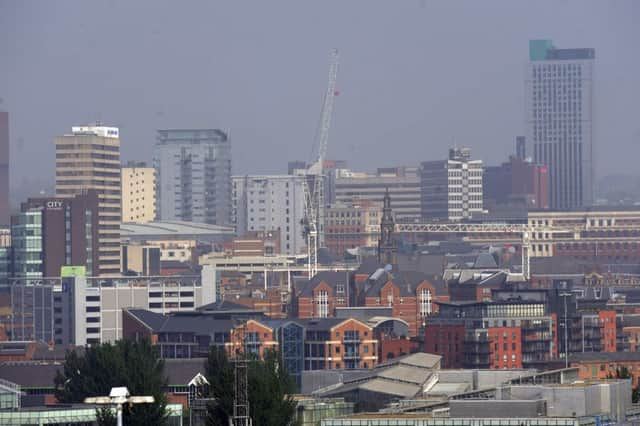Is a '˜pollution tax' the best way for Leeds to clean up its act on air quality?


That’s the central question behind a major citywide survey on the city’s proposed new Clean Air Zone (CAZ), a radical plan to tackle pollution which has already seen 7,000 people share their views.
Now council bosses are urging even more residents, workers, and commuters to have their say as the March 2 deadline for the clean-air consultation looms.
Advertisement
Hide AdAdvertisement
Hide AdAs part of the CAZ, there is a plan to charge buses, HGVs, taxis and private hire vehicles that fail to meet the latest emissions standards.
Private vehicles of any age would not be affected by the charges. But the announcement of the proposed fees - which could be as high as £100 per day for buses and lorries, and £12.50 a day for taxis and private hire vehicles - led to an outcry, with private hire drivers holding a go-slow protest in the city.
The proposed CAZ would cover all roads within the outer ring road with the M1 and M62 as the south-eastern boundary, but would not include vehicles that divert around the outer ring road, motorways, or vehicles which cross the city using the M621.
Advertisement
Hide AdAdvertisement
Hide AdThe council has been forced to take action after the city was branded one of the UK’s worsts pollution hotspots and was ordered by the Government to come up with an action plan to tackle the issue. The city is also likely to fail legal air quality levels by 2020.
Evidence has shown that pollution levels can worsen asthma symptoms, damage lung function and are linked with an estimated 40,000 premature deaths in the UK every year. One study claimed that almost 700 people a year in Leeds die from illnesses related to air pollution, with an overall cost to the local health economy of £480m.
Councillor Lucinda Yeadon, Leeds City Council’s executive board member with responsibility for the environment said: “Reducing air pollution in Leeds is vital for the health of our city, so it’s fantastic to see that almost 7,000 people have already shared their views on this important issue.
“The comments we receive as part of this consultation will help us provide a rounded proposal to submit to government later this year and ensure we are asking for support in the right areas, making sure we have the right funding to deliver the best possible proposal for Leeds.”
FINANCIAL HELP FOR BUSINESSES COULD BE INCLUDED
Advertisement
Hide AdAdvertisement
Hide AdThe council is consulting on a number of ideas, which include possible financial help for commercial drivers and businesses which could be affected by the Clean Air Zone.
The key areas are:
A Clean Air Zone covering roads within the outer ring road (with the M1 and M62 as the south-eastern boundary) that would charge buses, HGVs, taxis and private hire vehicles which fail to meet the latest emissions standards for vehicles (Euro 6 standard). The zone would not include vehicles that divert around the outer ring road or motorways.
Raising the emissions standard of taxi and private hire vehicles to ultra-low-emission, and lobbying for funding to help local drivers with the cost of replacing vehicles.
A number of other ideas to help the city hit legal air quality levels in the shortest possible timescale. These include exploring ‘support packages’ to encourage ordinary citizens to switch to ultra-low emission vehicles.
Advertisement
Hide AdAdvertisement
Hide AdThe council is also exploring specific packages of financial support for businesses which will be affected by the CAZ, to help make the transition to cleaner vehicles.
Councillor Lucinda Yeadon said: “I would urge everyone who hasn’t yet taken part to have their say on our plans for a charging clean air zone and other proposals to reduce air pollution before the consultation closes on Friday, March 2.”
See www.leeds.gov.uk/airqualityconsultation.
GERMAN COURT RULING COULD BE A ‘LANDMARK’
A court ruling yesterday is being seen as a potential landmark which could pave the way for cities to ban diesel vehicles.
A federal court in Germany ruled that some heavily polluting vehicles can be banned from the centres of Stuttgart and Dusseldorf.
Advertisement
Hide AdAdvertisement
Hide AdEnvironmental campaigners had sued dozens of German cities, arguing they have a duty to cut air pollution to protect people’s health. It is thought the decision could lead to similar restrictions across Europe. About 70 German cities have nitrogen dioxide levels above EU thresholds.